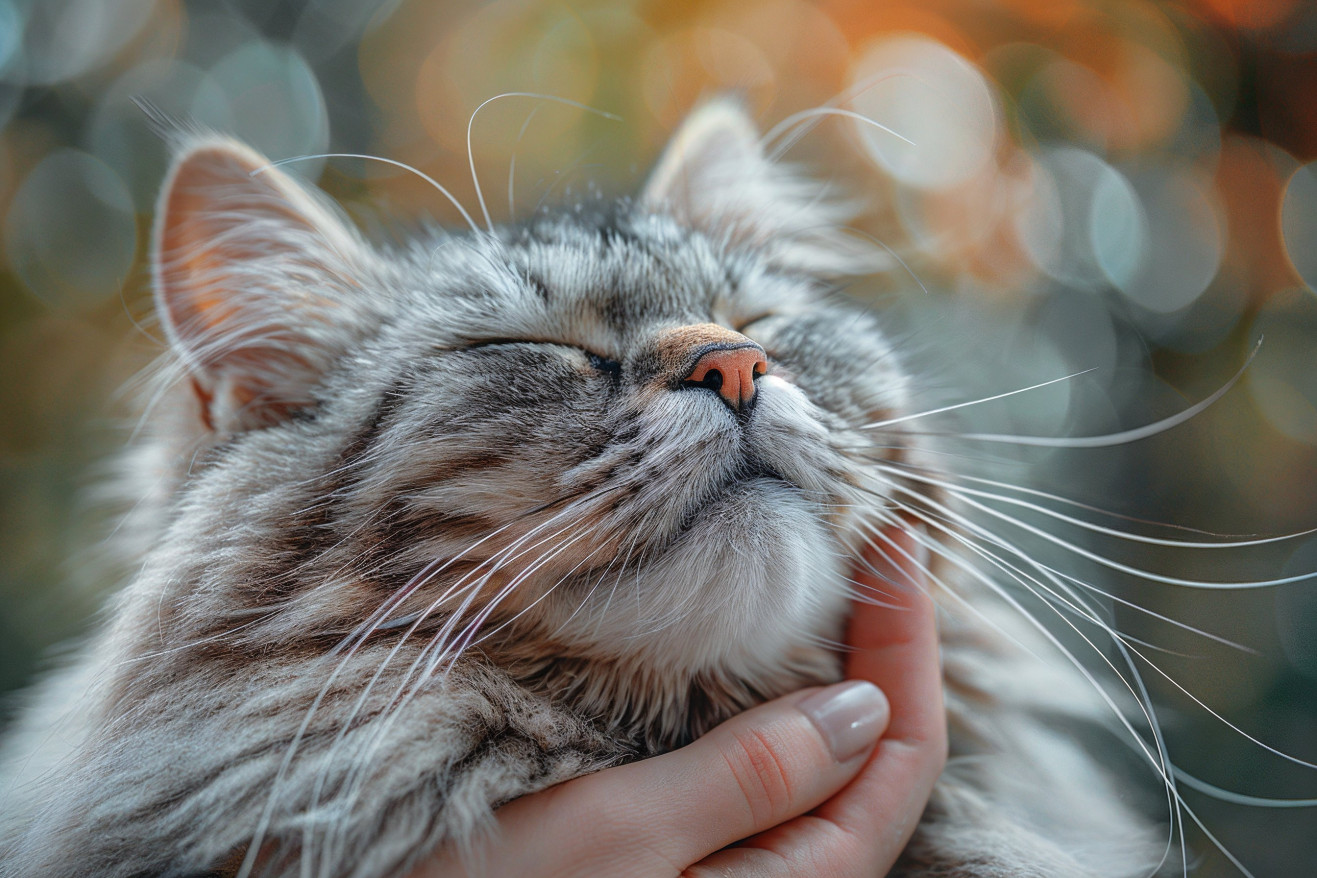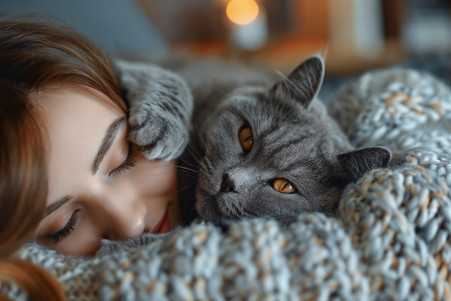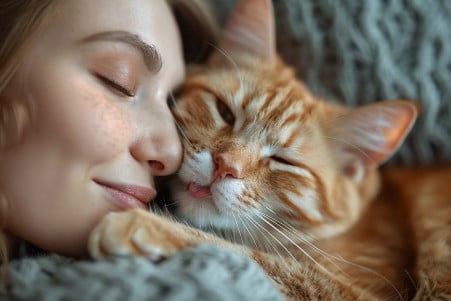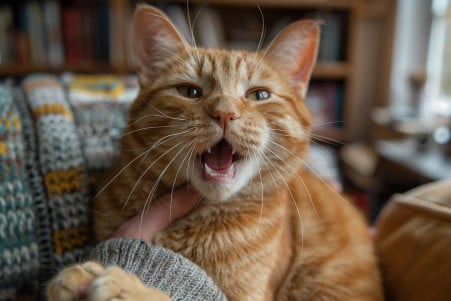Why Does My Cat Drool When I Pet Him? Unraveling This Feline Quirk
2 April 2024 • Updated 31 March 2024

While cat drooling is often harmless, excessive salivation during petting could signal dental issues, stress, or even an underlying medical condition – so it's important to understand the potential causes. Drooling when being petted is common in many cats and usually indicates they are feeling relaxed and content. However, excessive drooling can also be a sign of oral pain from dental disease or objecting to being over-stimulated by petting. Ruling out medical issues with your vet is wise if the drooling seems excessive.
As we delve into the research from veterinary medicine and animal behavior experts, we'll uncover the science behind why cats drool during petting and how to identify if it signals a bigger issue. By examining various scenarios and triggers that prompt this response, you'll gain valuable insights into better understanding your feline friend's oral health and emotional well-being. Armed with this knowledge, you can ensure a mutually enjoyable petting experience for both you and your cat.
Why does my cat drool when I pet him?
Drooling Indicates Relaxation and Satisfaction
When your cat drools while being petted, it’s a good sign that they are relaxed and happy. This is an instinctual response that dates back to kittenhood, when kittens would knead their paws on their mothers to stimulate milk release while nursing, according to The Spruce Pets. In adulthood, the act of kneading (or "making biscuits") and the bond formed during nursing can lead to drooling when a cat is satisfied.
In addition to drooling, purring and rubbing against you are other common signs that your cat is happy and enjoying the attention. PetMD even explains that some cats will drool when they are about to fall asleep, which is likely a sign of how comfortable and happy they feel in that moment. When these behaviors happen together, drooling is usually nothing to worry about and is a normal response for a cat.
Knowing that drooling is a sign of deep relaxation and satisfaction can help cat owners know when their pet is really enjoying the attention. As long as the drooling is occasional and happens with other signs of relaxation, cat owners can know that their pet is simply showing their gratitude in this unique and lovable way.
Excessive Drooling: Health Issues
While some drooling during petting is normal and a sign of contentment, excessive drooling can be a sign of a health issue. The Pet Health Network explains that dental issues such as gum disease and tooth decay can cause pain in the mouth, which can lead to drooling. Excessive drooling can also be caused by certain viral infections or if a cat swallows a foreign object.
Moreover, Catster notes that older cats may drool more due to dental issues that come with age or oral cancer. If you notice that your cat is drooling more than usual, or if the drooling seems excessive, it's important to take your cat to the vet to rule out any health issues. It can also be helpful to note the characteristics of the drool, such as if it's blood-tinged or has a bad odor, as this can help your vet determine the cause.
Knowing the health issues that can cause excessive drooling can help ensure that your cat is healthy. While some drooling is normal, if your cat's drooling is persistent or if you notice any other concerning symptoms, it's important to take your cat to the vet to get to the bottom of the issue.
Drooling Due to Over-Stimulation or Stress
Cats that drool when they are over-stimulated or overexcited during petting sessions are often sending a message that they are uncomfortable and need a break. The Pet Health Network notes that drooling can also be a sign of fear or anxiety, such as when a cat is in the car or at the vet.
To avoid drooling due to stress, it's important to watch for a cat's body language and give them space when they need it. Catster explains that creating a safe, calm environment and avoiding rough handling can help reduce stress. Knowing that drooling can be a sign of stress can help cat owners make sure their cats are comfortable during petting sessions.
Other Petting-Related Behaviors to Watch For
In addition to drooling, there are several other behaviors that cats may display while being petted that can help you better understand their emotional state and preferences. For example, purring is often a sign of happiness and contentment, but it can also be a sign of stress or pain according to Whiskas. Kneading, or "making biscuits," is an instinctual behavior that comes from a kitten's nursing days, according to Purina UK.
Cats may also lick themselves or their owner while being petted, which Vetstreet explains can be a sign of affection, grooming, or even a reaction to skin sensitivity. When these behaviors are considered in combination with other signs and the cat's overall body language, they can help you better understand your cat's emotional state and preferences.
Knowing what these petting-related behaviors mean can help you ensure that your cat has a more positive experience when you pet them. If you know what signs to look for that indicate your cat is happy, stressed, or uncomfortable, you can adjust your petting style to meet their needs.
How to Make Petting a Positive Experience for Your Cat
Watching your cat's body language and being mindful of their comfort levels are important when it comes to making petting a positive experience. The Pet Health Network notes that making sure your cat is in a calm and quiet environment and not overstimulating or overwhelming them will help prevent stress-induced drooling.
In addition to making sure you're not petting your cat too roughly, especially in sensitive areas like the stomach, Catster explains that respecting your cat's comfort levels and adjusting your petting style will help prevent drooling. It's also important to take into account your cat's age and any health issues they may have, as older or sick cats may have different needs.
Making sure your cat gets regular dental check-ups and preventive care can also help catch and prevent issues like dental disease and oral cancer that may lead to drooling. The Cornell Feline Health Center explains that it's important to make sure that dental issues are addressed to ensure that your cat is comfortable and healthy.
By taking the time to understand your cat's body language and health issues, you can make sure that you're petting your cat in a way that's comfortable for them and not causing them to drool excessively.
Conclusion: What Does It Mean When Your Cat Drools?
Drooling during petting can be a normal sign of relaxation and contentment in cats. However, excessive drooling may indicate dental issues, stress, or underlying medical conditions. By observing your cat's body language and overall behavior, you can gain insights into how your cat is feeling.
Regular dental care and check-ups are important for maintaining your cat's oral health. By understanding the causes of your cat's drooling, you can help ensure a positive petting experience.


